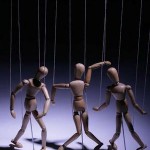
How Free is Our Free Will?
What are we to make of ‘free will’ in our lives, the ability to choose our own direction? The classic Catholic response is that human beings are created free because without freedom they could not choose to love God or love others. I was recently talking to a friend who was questioning how real this freedom was. Her point was that while we may say that we have free will, at the end of the day the choice is to love God or go to hell. For example if you ask a child whether they would rather eat chocolate or get stung by a bee, then they would obviously choose the least painful option but can we even call that a choice? I have certainly thought that same thing at times in my own life, but if I am honest they were always times when I did not feel that life was treating me so well and I began to resent ‘having’ to do the right thing lest I break a commandment.
We can fairly easily fall into the trap of being a bit tough on God though and legalistic on the concept of freedom. It is an unfair comparison to think that we either love God or go to hell, and I do not believe it is completely true. Those who are in hell are those who have fundamentally rejected truth, beauty and goodness in their lives. Edith Stein, a Jewish philosopher who converted to Catholicism and was later killed by the Nazis, is quoted as saying, “all who seek truth seek God whether this is clear to them or not”. Inversely she is saying that all who reject truth reject God whether this is clear to them or not. To complain that we are ‘forced’ to choose the right path is akin to complaining that we are ‘forced’ to avoid drinking poison because if we do we will die. And in that sense it is true, we are not completely free as human persons. If I walk out in front of a moving train, I will die. If I pull off my fingernails with a pair of clippers, it will hurt (a lot). Our freedom is certainly limited but to go down the path merely thinking ‘heaven’ or ‘hell’ will only lead to complete frustration and eventual insanity.
We do need to recognise that we are only human and that it does have its restrictions but unfortunately we live in a time when we are told that we can do anything we want or be whoever we want to be and this is a dangerous lie. We would be better to stop worrying about what God does or does not want and focus on what it means to be a man/woman/husband/wife/single person living in the 21st century. These personal characteristics are also ‘restrictions’ but the only choice we have is what we will do with them. If a person prefers to not even have these restrictions they will eventually fall into depression or even take their own life.
It is true that our freedom is given to us that we might choose the good, but, it is not the good for God’s sake, it is the good for our sake. If you want to walk into a hive of bees God will not stop you, if you want to eat 10kgs of chocolate in a day God will not stop you, similarly if you want to put on protective gear to visit the bees or eat that 10kgs of chocolate over a year, God will not stop you. It is up to us, and it has very little to do with God.
However for many people, at some point in their life, they have felt a yearning for more than bees and chocolate, a yearning for something that will last longer and be more substantial. That yearning can point to God, in his presence in the world and in a person’s heart. The usual response is to pray, to receive the sacraments and to put oneself under his laws revealed in our hearts and though Christ and his Church. When we break it down it becomes obvious that these are genuine choices but if those choices become only an option between heaven or hell then perhaps we have forgotten why we chose to walk a certain path in the first place. The simple truth of freedom is the pursuit of goodness, everything else is incidental and not worth getting caught up in.


